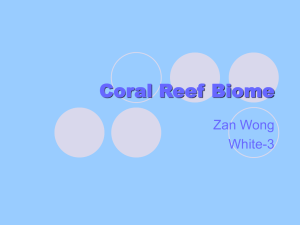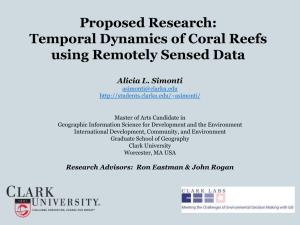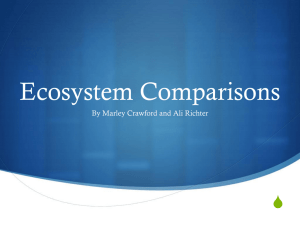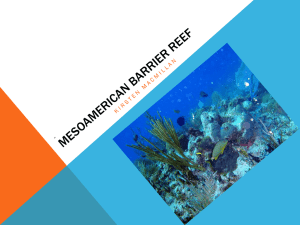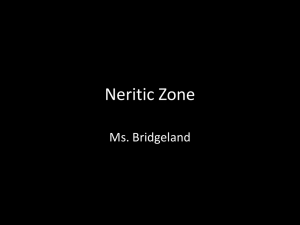Coral Reefs - Highland Park FPS
advertisement
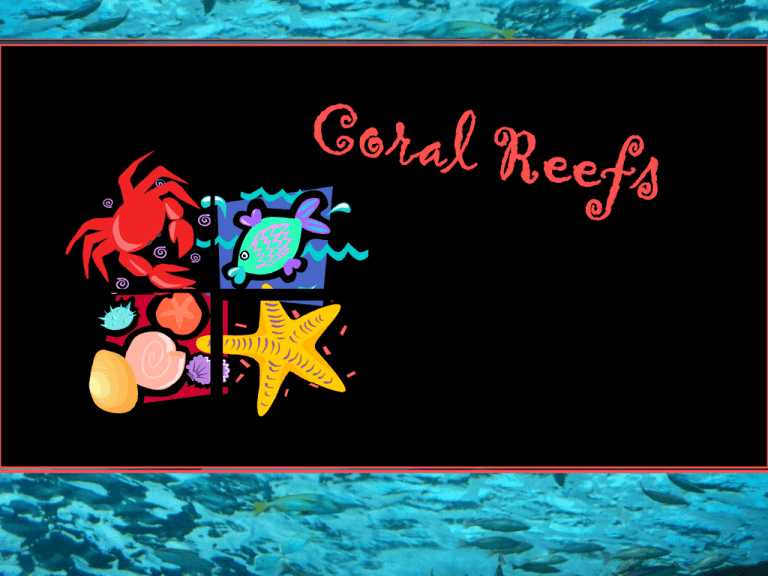
What is a Coral Reef, Exactly? Coral reefs are underwater structures formed by calcium carbonate which is produced and released by coral polyps. Coral polyps are marine animals similar to the sea anemone. The massive colonies of shells from the coral polyps help to form coral reefs. Coral reefs grow best in warm, shallow waters. “Rainforests of the Sea” •Reefs form complex ecosystems that are home for more than 1 million species- possibly the most diverse ecosystem on Earth. •Provide a home for over 25% of all marine life Yet, Coral reefs make up less than one-half of one percent (.005) of all ocean area. Why do we need Coral Reefs? Reefs help buffer the coastlines of over 100 countries from erosion and flooding Coral reefs bring in billions of dollars in economic activity and are home to nutrients and organic compounds with pharmaceutical potential. Who Needs Coral Reefs? It is estimated that 500 million people depend on reefs for food, building materials, tourist income or coastal reef protection. 30 million people are completely dependent on reefs for their livelihoods or land. Life within the Coral Reef: Biodiversity Life on a Reef Organisms that are part of Reefs include: 1 2 Fish– Some fish feed on small animals living near the coral or on the coral itself; other fish, including some sharks cruise the perimeter of the coral reef. Algae– Though a vital part of reef life, overfishing and excess nutrients from onshore can lead to algae encroachment, where algae can outcompete and kill the coral Life on a Reef, Continued : Item 3 Seabirds– Coral Reef systems provide habitats for seabird species, many of which are endangered. The short-tailed albatross has only 2200 surviving species Item 4 Cnidarians– organisms like jellyfish with specialized cells called cnidocytes. Cnidocytes are used used mainly for capturing prey which ranges from the size of plankton to animals larger than themselves. 5 Other inhabitants–Sea snakes and land based reptiles (crocodiles, lizards) feed on fish and their eggs. Coral Reef Survival: Threats Reefs at Risk Statistics •Approximately 10% of the world's coral reefs are dead • Around 60% of the world's reefs are at risk due to human-related activities. • In Southeast Asia it is estimated that 80% of reefs are endangered Coral Bleaching What is it? The exposure of the white skeleton of coral due to loss of the microscopic algae living inside coral polyps which give them color. •Scientists use language like mitigate and adapt to describe solutions to this threat. •They hope to identify and minimize environmental stressors which may prevent coral reefs from recovering for coral bleaching. •Are mitigating and adapting good approaches? Will these solutions last? Additional Threats to Consider •Human Contact •Sewage & Runoff • Destructive Fishing Practices •Tourism (Including diving and snorkeling) •Ocean Acidifcation The Canary in the Coal Mine •Coal miners used canaries to indicate whether a change in atmosphere had occurred. Toxic gasses would show visible affects on the canary before the miners. •Coral Reefs are considered the “canary in the coal mine” in respect to climate change because they show noticeable changes first. •Why is this a challenge? Future Solutions: Reef Survival Marine Protected Areas (MPA’s) • Marine Protected Areas describe areas or regions which have been placed under some restrictions in the interested of protecting the environment. •MPA’s do not necessarily restrict all human activity, but instead place limitations on what activities are allowed, for example fishing, fishing seasons, catch limits, etc. •MPA’s include a variety of reefs, but may not be a sustainable solution for the future. Solutions for Reef Ecosystem Integrity From the World Resources Institute •Integrating coastal zone management • Effective environmental laws •Educating policy makers and the public about how reef habitats should be maintained •Promoting environmentally sound practices for land use •Minimizing illegal fishing and developing sustainable fisheries •Developing disaster strategies Fast Forward: •Brainstorm future threats to coral reefs •How could ecotourism lead to positive effects on coral reefs? •How will coral reefs be used for in 50 years? • What will happen to living conditions on land if Coral Reefs die out?
